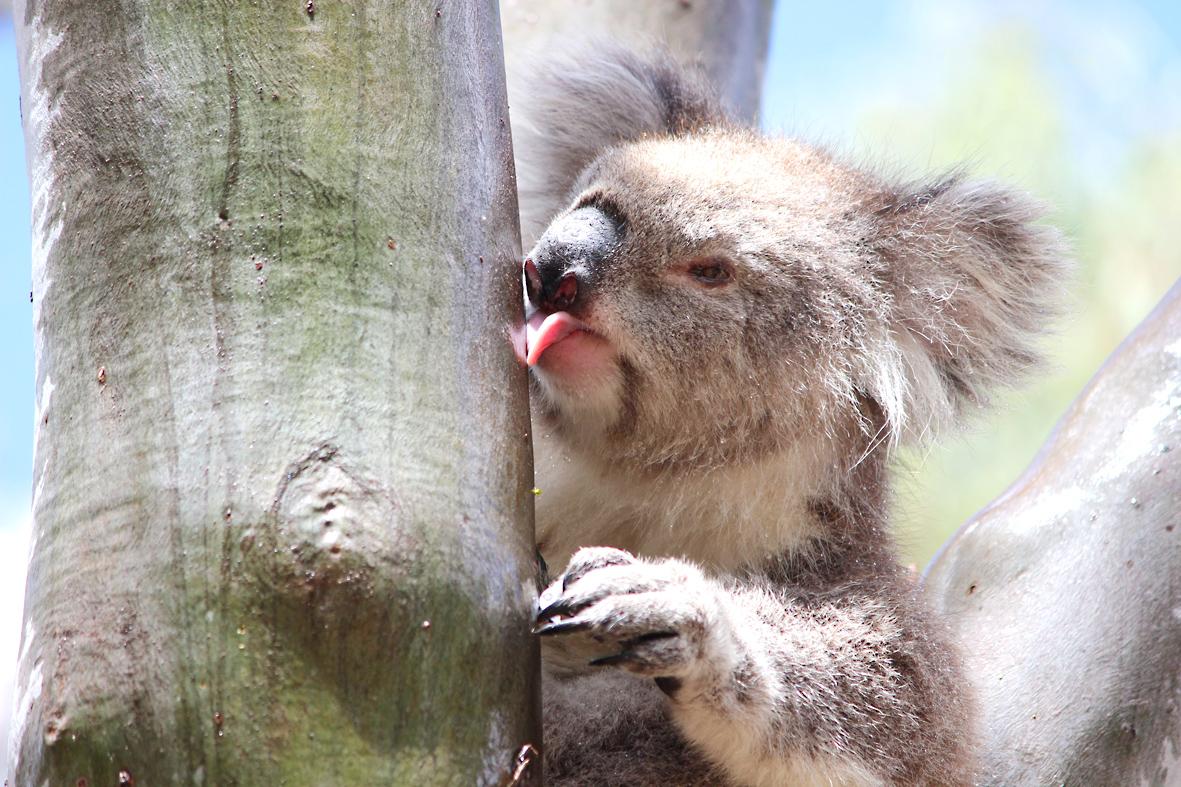Scientists have solved a lingering mystery about koala behavior — how these tree-dwelling marsupials native to Australia consume enough water to live.
A new study describes koala drinking behavior in the wild for the first time, finding that they lick water running down the smooth surface of tree trunks during rainfall — a phenomenon called “stemflow” — and do not rely merely on the water content of the leaves that make up their diet.
The findings, which the researchers said may be useful in koala conservation efforts, were based on 46 observations of koalas in the wild from 2006 to last year, mostly at You Yangs Regional Park in Victoria state.

Photo: Reuters
“I think the main message is that behavioral observations in the wild are very important to establish what is normal and what is unusual, and to truly understand what animals need. If we watch them carefully, they will tell us,” said University of Sydney ethologist Valentina Mella, lead author of the research published this week in the journal Ethology.
Koalas, which are not bears despite a common misconception, spend most of their lives high up in eucalyptus trees. They rely on a diet of eucalyptus leaves, normally consuming around 500 to 800 grams daily.
The word Koala is thought to have meant “no drink” in one of the Australian Aboriginal languages. The question of their water consumption had long been puzzling.
“Koalas have been alleged to never drink free water in the wild, or to drink only occasionally. Drinking behavior has often been considered unusual and attributed to disease or to severe heat stress,” Mella said.
“Koalas were thought to gain the majority of the water that they require from the moisture content in the leaves that they feed on and to drink water unintentionally in the wild by eating wet leaves after rain, or when dew is present on the leaf surface,” Mella added.
They sleep about 20 hours a day to conserve energy because their diet requires a lot of energy to digest.
“Koalas are nocturnal animals, so they are only active at night, and they are arboreal, which means that they live in trees and rely on them for food, shelter and, as we just discovered, also for drinking,” Mella said.
“Koalas actually spend 98 percent of their lives in trees and the only time they are on the ground is when they are trying to find another tree with a more generous food supply or a mate.”

Not long into Mistress Dispeller, a quietly jaw-dropping new documentary from director Elizabeth Lo, the film’s eponymous character lays out her thesis for ridding marriages of troublesome extra lovers. “When someone becomes a mistress,” she says, “it’s because they feel they don’t deserve complete love. She’s the one who needs our help the most.” Wang Zhenxi, a mistress dispeller based in north-central China’s Henan province, is one of a growing number of self-styled professionals who earn a living by intervening in people’s marriages — to “dispel” them of intruders. “I was looking for a love story set in China,” says Lo,

It was on his honeymoon in Kuala Lumpur, looking out of his hotel window at the silvery points of the world’s tallest twin skyscrapers, that Frank decided it was time to become taller. He had recently confessed to his new wife how much his height had bothered him since he was a teenager. As a man dedicated to self-improvement, Frank wanted to take action. He picked up the phone, called a clinic in Turkey that specializes in leg lengthening surgery — and made a booking. “I had a lot of second thoughts — at the end of the day, someone’s going

In the next few months tough decisions will need to be made by the Taiwan People’s Party (TPP) and their pan-blue allies in the Chinese Nationalist Party (KMT). It will reveal just how real their alliance is with actual power at stake. Party founder Ko Wen-je (柯文哲) faced these tough questions, which we explored in part one of this series, “Ko Wen-je, the KMT’s prickly ally,” (Aug. 16, page 12). Ko was open to cooperation, but on his terms. He openly fretted about being “swallowed up” by the KMT, and was keenly aware of the experience of the People’s First Party

Standing on top of a small mountain, Kim Seung-ho gazes out over an expanse of paddy fields glowing in their autumn gold, the ripening grains swaying gently in the wind. In the distance, North Korea stretches beyond the horizon. “It’s so peaceful,” says the director of the DMZ Ecology Research Institute. “Over there, it used to be an artillery range, but since they stopped firing, the nature has become so beautiful.” The land before him is the demilitarized zone, or DMZ, a strip of land that runs across the Korean peninsula, dividing North and South Korea roughly along the 38th parallel north. This